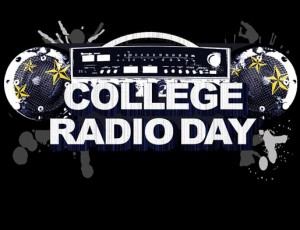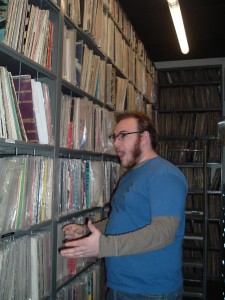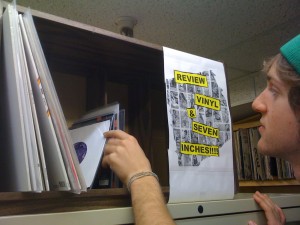I make it a habit to evangelize the importance and relevance of college radio and that passion led me to create my Spinning Indie blog back in 2008. One of my main goals was to spread the word about college radio and also to remind people about the interesting stations in every pocket of the United States (see my Spinning Indie 50 State Tour for more on that).
But, unfortunately in recent years my task has focused more on spreading the word about college radio station sales and takeovers, which have reached a crisis point. So, now, not only am I reminding people that college radio still exists and is relevant, but also that it is worth fighting for and saving. Luckily there are more and more people catching on to this cause and more and more efforts focused on the preservation of college radio.
In addition to specific activism efforts such as WFMU’s 15-station multicast in support of Saving KUSF and CBI’s “Minute of Silence” on the day that KTRU went off the terrestrial airwaves, the latest project, College Radio Day is a new event focused on promoting college radio. Slated for October 11, 2011, College Radio Day was created in order “to harness the combined listenership of hundreds of thousands of college radio listeners throughout North America and to celebrate the important contribution of college radio to America’s airwaves by uniting for this one day.”
Rob Quicke, General Manager of WPSC at William Paterson University (Wayne, New Jersey), came up with the concept for College Radio Day and has already garnered the support of 60 radio stations (including some high school radio stations) and several college radio organizations, including CBI and IBS. A few stations from my DJ past are already participating (KZSU and WBGU) as are several that I’ve visited over the years (KUSF and WNUR).
Quicke got his start in college radio when he helped to set up and launch Oxygen 107.9FM at Oxford University in 1997. According to Quicke, this was the first student FM station in the UK. Sadly, after its auspicious beginnings (which included several founding members getting a meet and greet with the Queen), Oxygen’s life on FM was limited, with the station leaving the airwaves in 2001, to be replaced by Oxide FM.
After a stint in commercial radio, Quicke moved on to student radio, initially serving as the advisor for WXAV in Chicago. He let me quiz him this week about what he has in store for the first-ever College Radio Day and how it fits into other radio activism efforts.
Jennifer Waits: Did something specific prompt you to create College Radio Day?
Rob Quicke: I specifically remember watching ‘The Social Network’ in December last year and getting inspired and thinking to myself, I wonder whether it’s possible to come up with an idea related to college radio that could really bring everyone together in a way that has never been done before? I slept on it and woke up the next day with ‘College Radio Day.’ Then it was a search for the domain name and to see if anyone had done anything like this before, which I do not think they have. Then there was a long period of 6 months of development when I was building the website and putting together a mission statement and other things. It was tough keeping it under wraps for 6 months! I wanted to share the idea right away – because it’s about time that college and high school radio stations in this country *all* came together and, united, delivered a strong message that college radio is an important medium in the American media landscape. I think a lot of people need to be reminded of how unique and important college radio is.
Jennifer: How many stations are participating so far? How many of those are college radio stations?
Rob: We launched on June 6 and as of June 21, we have 60 stations in 25 states! About 80 percent are college stations. We are aiming for at least 100 to be signed up for the day. But, being honest, I don’t see why we shouldn’t aim to have several hundred. We’re all in this thing together, so why not? October 11 is not too far away, so we are going all out at this point!
Jennifer: Is there a connection between College Radio Day and the recent flurry of college radio station sales/takeovers?
Rob: Yes. Originally College Radio Day was solely conceived as a celebration of college radio, a proactive event to remind people of the area left of the dial where they will hear groundbreaking programming. After all, the aim of the day is to get people to listen to their local college or high school radio station on the day (and hopefully stay listening). But as the recent college station sell-offs have shown, there is also a strong need to remind colleges and universities that selling off their college stations silences their students’ voices. We need to take a stand and collectively say “no more stations must be sold!” Whole future generations of broadcasting alumni vanish into thin air when a college station is sold.
Jennifer: Are you aware of the recent on-air activism efforts in support of keeping college radio stations on the air. Specifically, the 15-station live multi-cast organized by WFMU featuring DJs from KUSF on February 18 and the CBI-organized “Minute of Silence” on April 28th? How are those efforts similar to College Radio Day?
Rob: I was not aware of the live multi-cast organized by WFMU, but was aware of the CBI-organized “Minute of Silence” in which WPSC, William Paterson University’s station, did participate. I thought that was a brilliant idea and something that sent out a strong message of unity from all the college stations that took part. I think that College Radio Day further continues those ideas and promotes strength through unity, on a national scale. I don’t think anyone is stepping on anyone’s toes (so to speak) – all these efforts are worthy because they directly promote college radio as an important medium that must not be taken for granted and must not be diminished.
- KZSU GM Samuel Franco in the KZSU library back in 2009 (Photo: J. Waits)
Jennifer: Will there be any College Radio Day efforts focused on helping spread the word about college radio station sales? Or focused on helping stations in danger of being sold/currently fighting sales (such as KUSF and WRVU)?
Rob: We are already doing our best through social media and with interviews and press releases to bring this important issue to people’s attention. I also recognize that there are organizations such as CBI and IBS, for example, who are already doing an excellent job of championing this issue, and we support their worthy efforts 110%. We are working on an idea to give the DJs of those sold college radio stations an opportunity to be heard once more, throughout the country, on College Radio Day. I hope that College Radio Day will raise the profile of college radio stations and make it harder for college administrators to snuff out any part of such a vibrant and important community.
Jennifer: Can you tell me a bit about the keynote that you are asking stations to air on October 11th? Who is producing it and what will the content be?
Rob: I felt that the stations who participate could play something on the air that sums up the mission of college radio, and also provide a sort of ‘state of the union’ of college radio in North America. So the feature will be looking at the past, present, and most importantly, the future of college radio. I will be
producing it along with Len O’Kelly from Grand Valley State University (advisor to The Whale) and Peter Kreten from Saint Xavier University (advisor to WXAV 88.3 FM), and it will feature many advisors and students from the stations who have signed up for the day. There will be two versions, a 15-minute edit, or the full 30-minute version (split into 2 parts) and stations can choose which one to play. Our aim is not to interfere much with what programming stations are planning for the day.
Jennifer: Why do you love college radio?
Rob: I love the energy, the passion and the fact that the students are not jaded in their approach to radio. As General Manager of WPSC FM at William Paterson University I genuinely enjoy the raw energy that the students have for broadcasting. It’s infectious and I believe it keeps me young! I also like how students often form connections with the local community that you won’t hear on most commercial radio stations. College radio should not have to be commercially viable, but should be brave and passionate in what it does. I love its authenticity.
Jennifer: What do you think stations should do in order to ensure their futures?
Rob: As recent events have shown, there is no magic solution or strategy to prevent colleges from selling off their college stations. However, if stations are fiercely passionate about what they are doing and are invested in campus life and activities as well as the local town and community, then if the time comes to make a stand such a station will find itself with many, many friends. It will also make the decision to sell the station much more difficult for the college or university.
I truly believe that college radio plays a hugely valuable role in discovering the next big music artists as well as being a vital training ground for future media broadcasters. Stations must always stay true to the mission of college radio, to their listening community and never surrender. No guts, no glory!





